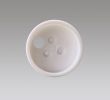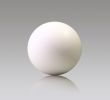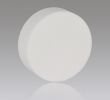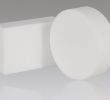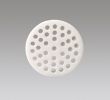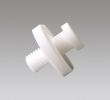MACOR® machinable ceramic products
MACOR® is a technical glass ceramic that is easy to machine. This outstanding machinability allows for very complex geometries with a very fine finish. Other properties of this material include its excellent radiation resistance and very good dimensional stability at high temperatures. The unique combination of properties of MACOR® allows it to be used in a wide range of industrial and research applications. MACOR® has the advantages of a technical ceramic, the versatility of a high performance polymer and the machinability of a soft metal.
MACOR® products
MACOR® products can take the form of semi-finished products such as plates or bars that our customers are free to machine themselves (MACOR® is very easily machined with conventional carbide tools). As an official CORNING distributor of MACOR®, we offer in particular raw maxi-slabs with useful dimensions of 317 x 317 x 54mm, bars with a diameter of 76mm x length of 311 mm, rods, strips, optimised blanks, etc. We also carry out custom machining of MACOR® parts to drawings.
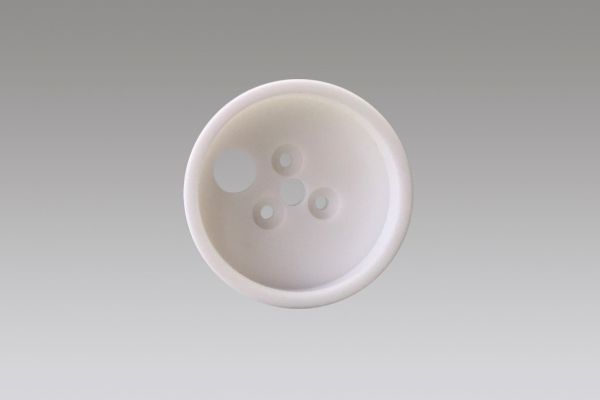
Why choose MACOR® as a material?
MACOR® machinable glass-ceramics offer a simple and relatively effective alternative to DEGUSSIT technical ceramics for applications with less stringent requirements in terms of temperature resistance, mechanical strength or wear resistance. The combination of properties offered by the MACOR® ceramic material is unique. This white material is odourless and has zero porosity, avoiding any outgassing under vacuum. It has a coefficient of expansion close to that of most metals and other sealing glasses. It is stable at high temperatures: up to 1000 °C in peak (and 800 °C continuously), unlike ductile materials, it does not deform. Finally, it is resistant to radiation. Once machined, MACOR® offers an excellent, very smooth surface.
It is an excellent electrical insulator, its electrical conductivity being as low as that of plastics, even at high temperatures. It is also a very good thermal insulator and thus a good solution for high voltage applications. What is particularly remarkable about this material is its ease of machining (even with very tight tolerances and/or surface finish). This property is due to its composition which, together with CORNING's expertise in production processes, results in a MACOR® composed of 55% fluorophlogopite (Mica) and 45% borosilicate glass. Its excellent machinability allows for dimensional tolerances of +/- 0.013 mm, roughness of 0.5 μm and a polished finish of 0.013 μm.
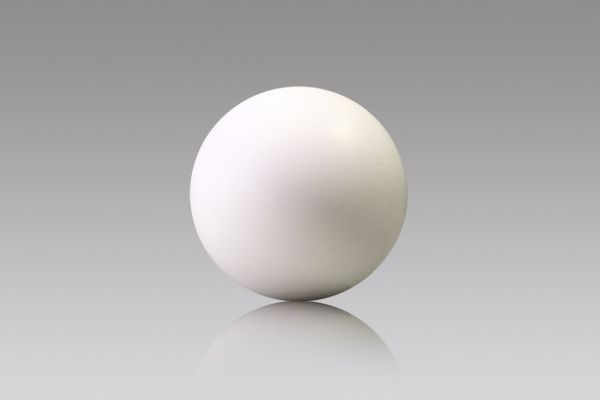
The advantages of MACOR® in machining
Machining is the process of going from raw material to finished parts according to drawing. In order to perform precision machining, the factors to be considered are the cutting speeds and the coolant used. MACOR® ceramics can be machined using high-speed steel tools, but carbide tools are still strongly recommended. It is advisable to use a water-soluble cutting oil suitable for machining ceramics and glass (e.g. Cimstar from Cimcool).
For grinding, diamond wheels made of silicon carbide or alumina are very suitable. For polishing, it is best to start with a steel wheel and a P400 silicon abrasive powder and finish the polishing with a felt wheel and a very fine alumina abrasive powder. This achieves a polish of 0.013 μm. Sawing requires the use of a carbide blade with teeth and a speed close to 0.5 m/s, but another possibility is the use of diamond or silicon carbide cut-off wheels. Finally, for tapping, it is simply advisable to tap in one direction only and with constant watering to avoid the accumulation of machining sludge. It is also recommended to make holes larger than those indicated for metals. MACOR® offers many advantages in ceramic machining. It requires the use of conventional machining tools but allows the design of parts with extremely complex geometries and therefore excellent precision tools. Finally, no heat treatment or annealing is required after machining, which considerably reduces production time and therefore the delivery time of the parts and thus offers good cost effectiveness.
What are the areas of application of MACOR® ceramics?
MACOR® machinable ceramic components are used in many areas where high precision is required. They are used in aerospace and aeronautics (to create mechanical seals on certain probes and retaining rings, for example), in laser technologies, etc. They are also very useful in constant vacuum or ultra-high vacuum environments (as coil supports or as insulators, for example). They are also used in the nuclear industry as they are resistant to radiation. Among other things, they can be used as dimensional references since their dimensions are not affected by nuclear radiation. Their properties can also be useful in the chemical, weapons, automotive and other industries and research fields.





